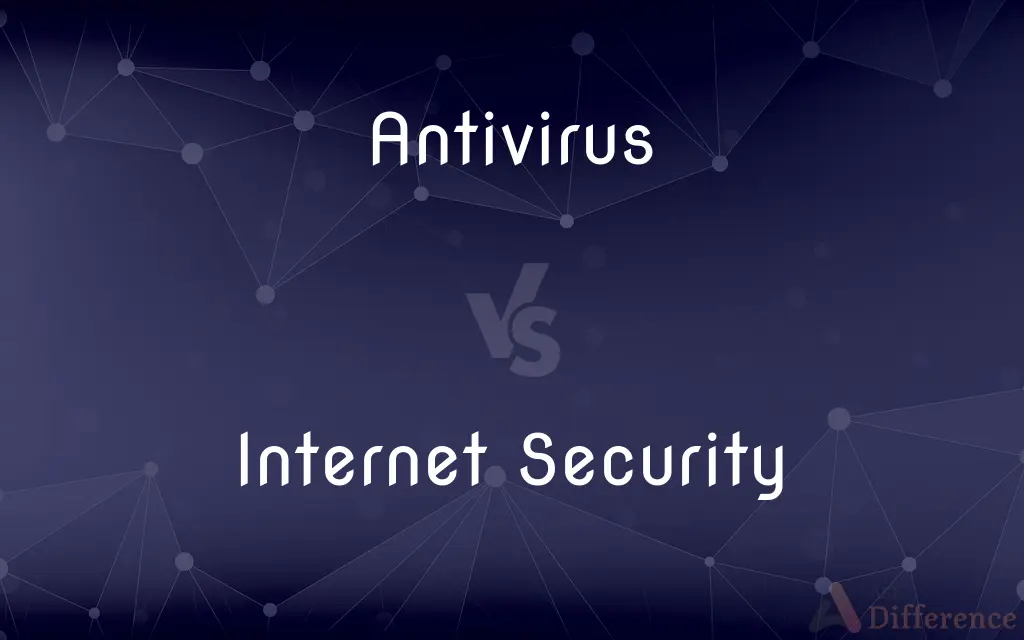Antivirus vs. Internet Security — What's the Difference?
By Tayyaba Rehman — Published on January 9, 2024
Antivirus software detects, removes, and prevents computer viruses. Internet Security offers broader protection, including antivirus features, alongside safeguards against online threats like malware, phishing, and firewall protection.

Difference Between Antivirus and Internet Security
Table of Contents
ADVERTISEMENT
Key Differences
Antivirus software focuses on detecting, removing, and preventing specific types of malware, primarily viruses, from infecting devices. It provides scanning and removal tools targeting known viruses but might lack broader security components. Internet Security encompasses antivirus features along with a broader suite of tools safeguarding against diverse online threats like malware, phishing attacks, firewalls, and web protection.
Antivirus software primarily tackles known virus threats, employing signature-based detection and removal techniques. It might lack additional features like firewall protection or defense against other evolving threats. Internet Security, on the other hand, offers a comprehensive suite, including antivirus, firewall, anti-phishing, and other tools for broader online protection.
Antivirus software operates on known virus signatures, often requiring frequent updates to detect new threats effectively. It focuses solely on virus prevention and removal, lacking the advanced security layers that Internet Security provides, such as proactive threat detection and web filtering capabilities.
While antivirus software is vital for detecting and eliminating viruses, it may not defend against newer threats like zero-day attacks or sophisticated malware. Internet Security, with its multifaceted approach, offers a more comprehensive defense against various online threats, enhancing overall device protection.
Antivirus software typically focuses on virus protection, providing scanning and removal tools, while Internet Security is a comprehensive suite offering antivirus alongside features like firewall protection, secure browsing, and protection against diverse online threats.
ADVERTISEMENT
Comparison Chart
Scope of Protection
Targets specific malware like viruses
Offers broader protection against viruses, phishing, firewalls, etc.
Included Features
Primarily antivirus scanning and removal
Antivirus combined with firewalls, anti-phishing, web protection, etc.
Coverage Depth
Focused on virus detection and removal
Comprehensive defense against diverse online threats and attacks
Flexibility and Adaptability
Relies on known virus signatures, may lack newer threat defense
Proactive defense with advanced security layers and proactive measures
Comprehensive Protection
Limited to virus protection
Offers a wider array of protection against multiple online threats
Compare with Definitions
Antivirus
Protects systems by identifying and neutralizing viruses.
The antivirus software quarantined the detected malware.
Internet Security
Offers antivirus alongside firewall protection.
Internet security safeguards against viruses and online breaches.
Antivirus
Focuses on detecting known virus signatures.
Regular updates enhance antivirus software effectiveness.
Internet Security
Protects against malware, phishing, and more.
Internet security prevents phishing attempts and malware attacks.
Antivirus
Detects and eliminates specific types of malware.
Installing antivirus software ensures a virus-free device.
Internet Security
Ensures safe browsing and defends against cyber threats.
Internet security secures online activities from cyber threats.
Antivirus
Essential for safeguarding against virus infections.
Antivirus prevents viruses from compromising your system.
Internet Security
Comprehensive protection against online threats.
Internet security shields devices from diverse online attacks.
Antivirus
Software detecting and removing computer viruses.
Antivirus scans the system and removes detected viruses.
Internet Security
Comprehensive suite defending against diverse online risks.
Installing internet security software shields against various online threats.
Antivirus
Of or relating to a software program designed to identify and remove known or potential computer viruses.
Antivirus
(computing) A piece of software that is used to detect, delete and or neutralize computer-based viruses.
Common Curiosities
Is antivirus software effective against all types of malware?
Antivirus software is primarily designed for viruses and might not be as effective against other evolving threats like zero-day attacks.
What does antivirus software primarily target?
Antivirus software primarily targets and removes specific types of malware, especially viruses, from devices.
How does antivirus software detect viruses?
Antivirus software uses known virus signatures and scanning methods to detect and remove viruses from devices.
What does internet security software offer beyond antivirus?
Internet security encompasses antivirus alongside broader protection, defending against various online threats like phishing, firewalls, and more.
Does internet security cover protection beyond viruses?
Yes, internet security offers comprehensive protection, including antivirus, firewall, anti-phishing, and web protection against diverse online threats.
Is internet security only for computers?
No, internet security offers protection for various devices like computers, smartphones, tablets, etc., against online threats.
Does internet security affect device performance?
While there might be a minimal impact, good internet security software is designed to provide protection without significantly affecting device performance.
How does internet security enhance online protection?
Internet security offers a multi-layered defense, including antivirus, firewalls, and proactive measures, safeguarding against diverse online threats.
Why are regular updates important for antivirus software?
Regular updates ensure antivirus software remains effective by providing new virus signatures to detect evolving threats.
Can internet security protect against hacker attacks?
Yes, internet security includes features like firewalls to protect against unauthorized access and hacker attacks.
Can antivirus software remove existing viruses from a device?
Yes, antivirus software scans and removes detected viruses from the device, helping clean infected systems.
Can antivirus software prevent all viruses from infecting a device?
While effective, antivirus software may not catch all viruses, especially newer threats that might bypass known signatures.
Can antivirus software prevent malware from entering a system?
Antivirus software helps prevent malware by detecting and removing known threats but might not catch all evolving malware variants.
Does internet security defend against phishing attacks?
Yes, internet security includes anti-phishing measures, protecting against fraudulent attempts to obtain sensitive information.
How often should antivirus software be updated?
It's recommended to update antivirus software regularly, preferably daily or as often as new updates are available.
Share Your Discovery

Previous Comparison
Icing Sugar vs. Powdered Sugar
Next Comparison
Compiled Language vs. Interpreted LanguageAuthor Spotlight
Written by
Tayyaba RehmanTayyaba Rehman is a distinguished writer, currently serving as a primary contributor to askdifference.com. As a researcher in semantics and etymology, Tayyaba's passion for the complexity of languages and their distinctions has found a perfect home on the platform. Tayyaba delves into the intricacies of language, distinguishing between commonly confused words and phrases, thereby providing clarity for readers worldwide.














































